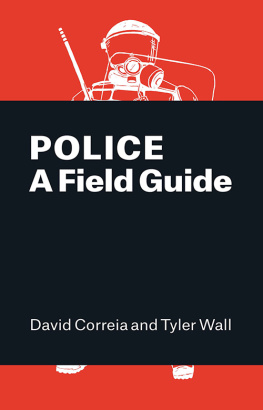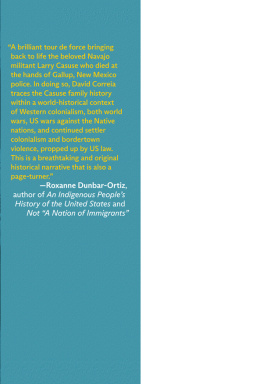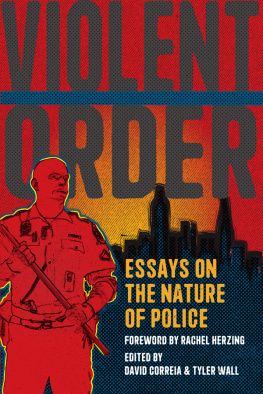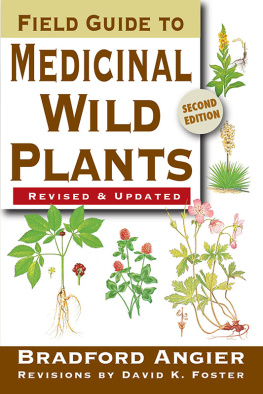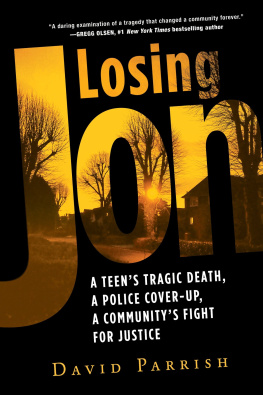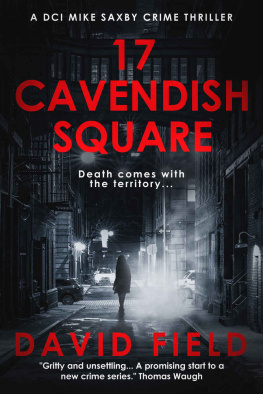David Correia - Police: a Field Guide
Here you can read online David Correia - Police: a Field Guide full text of the book (entire story) in english for free. Download pdf and epub, get meaning, cover and reviews about this ebook. year: 2018, publisher: Lightning Source Inc.;Verso Books, genre: Politics. Description of the work, (preface) as well as reviews are available. Best literature library LitArk.com created for fans of good reading and offers a wide selection of genres:
Romance novel
Science fiction
Adventure
Detective
Science
History
Home and family
Prose
Art
Politics
Computer
Non-fiction
Religion
Business
Children
Humor
Choose a favorite category and find really read worthwhile books. Enjoy immersion in the world of imagination, feel the emotions of the characters or learn something new for yourself, make an fascinating discovery.
- Book:Police: a Field Guide
- Author:
- Publisher:Lightning Source Inc.;Verso Books
- Genre:
- Year:2018
- Rating:3 / 5
- Favourites:Add to favourites
- Your mark:
- 60
- 1
- 2
- 3
- 4
- 5
Police: a Field Guide: summary, description and annotation
We offer to read an annotation, description, summary or preface (depends on what the author of the book "Police: a Field Guide" wrote himself). If you haven't found the necessary information about the book — write in the comments, we will try to find it.
David Correia: author's other books
Who wrote Police: a Field Guide? Find out the surname, the name of the author of the book and a list of all author's works by series.
Police: a Field Guide — read online for free the complete book (whole text) full work
Below is the text of the book, divided by pages. System saving the place of the last page read, allows you to conveniently read the book "Police: a Field Guide" online for free, without having to search again every time where you left off. Put a bookmark, and you can go to the page where you finished reading at any time.
Font size:
Interval:
Bookmark:

Police
A Field Guide
David Correia is Associate Professor in the Department of American Studies at the University of New Mexico. He is the author of Properties of Violence: Law and Land Grant Struggle in Northern New Mexico.
Tyler Wall is Assistant Professor in the Department of Sociology at the University of Tennessee in Knoxville.
A Field Guide

First published by Verso 2018
David Correia and Tyler Wall 2018
All rights reserved
The moral rights of the authors have been asserted
1 3 5 7 9 10 8 6 4 2
Verso
UK: 6 Meard Street, London W1F 0EG
US: 20 Jay Street, Suite 1010, Brooklyn, NY 11201
versobooks.com
Verso is the imprint of New Left Books
ISBN-13: 978-1-78663-014-8
ISBN-13: 978-1-78663-014-8 (US EBK)
ISBN-13: 978-1-78663-014-8 (UK EBK)
British Library Cataloguing in Publication Data
A catalogue record for this book is available from the British Library
Library of Congress Cataloging-in-Publication Data
A catalog record for this book is available from the Library of Congress
Typeset in Arnhem by Biblichor Ltd, Edinburgh, Scotland
Printed and bound by CPI Group (UK) Ltd, Croydon, CR0 4YY
Introduction:
Copspeak and the False Promise of Police Reform
Weaponology:
Technologies and Tactics of Police Violence
The Oath:
Core Values of Police
Models of Policing:
How the Police Are Organized and Defended
Using the Force:
How Police Impose Order
Copspeak:
How the Police See the World
Copspeak and the False Promise of Police Reform
Police violence is not a new phenomenon. Nearly fifty years before Ferguson, Missouri erupted in anger at the police killing of Mike Brown in 2014, James Baldwin wrote that Black communities in the United States are policed like occupied territory.
Fifty years before police demanded Black obedience to mostly white cops during anti-police violence protests in Baltimore, Milwaukee, Baton Rouge and dozens of other cities, Baldwin wrote in 1966 that the law is meant to be my servant and not my master, still less my torturer and my murderer. To respect the law, in the context in which the American Negro finds himself, is simply to surrender his self-respect.
Nearly fifty years before Charlotte, North Carolina police refused to release the video of Keith Scotts killing because, as the cops claimed, they needed to finish their investigation of their own killing, Baldwin wrote, I have witnessed and endured the brutality of the police many more times than oncebut, of course, I cannot prove it. I cannot prove it because the Police Department investigates itself, quite as though it were answerable only to itself.
Fifty years before waves of police in riot gear used tear gas and truncheons to protect white-owned businesses in Minneapolis and New York from Black Lives Matter activists, Baldwin wrote that police are present to keep the Negro in his place and to protect white business interests, and they have no other function. They are, moreovereven in a country which makes the very grave error of equating ignorance with simplicityquite stunningly ignorant; and, since they know that they are hated, they are always afraid. One cannot possibly arrive at a more surefire formula for cruelty.
2014 ushered in an era of police violence and antipolice violence activism and protest, but Baldwin reminds us that it is only the most recent. In his time, Baldwin was pessimistic about the prospects for police reform. There have been decades of police reform since Baldwin wrote about everyday racialized police violence in Harlem, but as the passages above demonstrate, little has changed. We share Baldwins pessimism regarding the possibilities and promises of police reform. Like Baldwin, we understand racialized police violence to be a permanent feature of police as we know it. The excuses and explanations for police violencetoo many bad apples, too little faith in policeserve only to draw our attention away from where it should be: on the persistent historical fact of racialized police violence against the poor. In the fifty years since Baldwin wrote about police as a lethal occupying army in the Black ghetto, there has been no end to police reform and equally no end to police killing and the routine harassments, humiliations, and fear that constitute policing. Indeed, if anything, police reform has only intensified the policing and caging of the poor and of people of color.
This is a book about the language of police and police reform, both of which come to us in a register we might call copspeak: a language that limits our ability to understand police as anything other than essential, anything other than the guarantor of civilization and the last line of defense against what police call savagery. When we see the world that copspeak describes to usone forever threatened by disorder and chaoswe have no choice but to trust that police, even in Ferguson, can get better; no option other than to hope that police reform, even in Baltimore, will work; and no alternative than to believe that the police even in its current formparticularly in its current formis indispensable. And so copspeak promises us police reform. But police reform never ends police violence, because police reform has always and only sought to improve the image of police and to shore up police legitimacy more generally. It has never sought to confront police as the lethal force it is, one charged by the state with managing poverty, patrolling the color line, and ruthlessly protecting establishment and economic interests. When asked by political elites how they could quell the anger in the ghetto, Baldwin reminded them that people in the ghetto knew all too well that police only protect and serve the bottom line of developers and real estate speculators. Are their profits more important than the health of our children? he asked. But of course this was merely a rhetorical question. The only thing most Black folks hate more than the ghetto, he explained, is police.
Copspeak works because it is convincing to so many. The fear and suspicion that Black and Hispanic and Indigenous and poor and immigrant communities hold for police is matched in the United States by the nearly universal faith and respect held for police by economically secure, mostly white communities. It is to that largely white constituency that police reformers speak in the wake of outrageous police violence. To the furious protesters marching in the streets, police respond with SWAT units and tear gas; to the white communities who nervously watch events unfold on television, they promise better training, an end to overt racial profiling, and more oversight of police. Copspeak is about pacification, not transformation.
When we listen closely, we can hear police admitting all of this. Speaking shortly after her confirmation as US Attorney General in 2015, Loretta Lynch addressed the unrest in Baltimore following the police killing of Freddie Gray. We have seen brave officers upholding the right to peaceful protest, while also sustaining serious injury during the citys unfortunate foray into violence. And we have watched it all through the prism of one of the most challenging issues of our time: policecommunity relations. Lynch would return to this theme of policecommunity relations often in the speeches that followed, a theme her predecessor Eric Holder emphasized as well. The goal of police reform, she said in remarks following her swearing-in ceremony, was to restore trust and faith, both in our laws and in those of us who enforce them. In other words, the problem is not police violence but the lack of faith some hold for our police officers. Its a familiar depiction of the problem of police violence as always anomalous rather than by design, as always a problem of bad apples rather than institutionalized violence against the poor. As always about you and rarely about police.
Font size:
Interval:
Bookmark:
Similar books «Police: a Field Guide»
Look at similar books to Police: a Field Guide. We have selected literature similar in name and meaning in the hope of providing readers with more options to find new, interesting, not yet read works.
Discussion, reviews of the book Police: a Field Guide and just readers' own opinions. Leave your comments, write what you think about the work, its meaning or the main characters. Specify what exactly you liked and what you didn't like, and why you think so.

